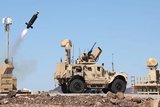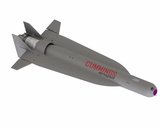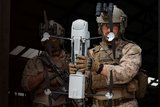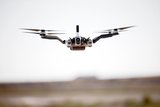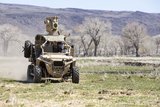PHASA-35 completes endurance trials with sensor payload
Following its initial flight in February, the PHASA-35 HALE UAV has successfully completed critical endurance trials.
PHASA-35 was demonstrated as a fully integrated system together with a communications sensor payload from Dstl (this included an RF frequency sensing software-defined radio that provided a real-time and secure data link).
The trials, in a dedicated 40m hangar near Farnborough, involved BAE Systems, Prismatic and the UK Defence Science and Technology Laboratory.
BAE Systems announced on 11 October that the 35m-wingspan aircraft operated for 72h ‘in a simulated environment that models the harsh stratospheric conditions in which the aircraft is designed to operate’.
Further flight trials are due to take place ‘in the coming months’, the company added, noting that PHASA-35 ‘could enter initial operations with customers within 12 months of completion of its flight trials programme’.
Designed to operate unmanned in the stratosphere above the weather and conventional air traffic, the solar-electric PHASA-35 has the potential to stay airborne for up to a year at a time.
As part of our promise to deliver comprehensive coverage to our Defence Insight and Premium News subscribers, our curated defence news content provides the latest industry updates, contract awards and programme milestones.
Related Equipment in Defence Insight
More from Uncrewed Vehicles
-
![Cummings Aerospace showcases Hellhound loitering munition designed for US Army’s LASSO programme (video)]()
Cummings Aerospace showcases Hellhound loitering munition designed for US Army’s LASSO programme (video)
Cummings Aerospace presented its turbojet-powered Hellhound loitering munition at SOF Week 2025, offering a man-portable solution aligned with the US Army’s LASSO requirements.
-
![SOF Week 2025: PDW unveils attritable FPV drone for SOF operations at scale]()
SOF Week 2025: PDW unveils attritable FPV drone for SOF operations at scale
PDW has revealed its Attritable Multirotor First Person View drone at SOF Week 2025, offering special operations forces a low-cost, rapidly deployable platform for strike and ISR missions, inspired by battlefield lessons from Ukraine.
-
![SOF Week 2025: Teledyne FLIR white paper provides guidance on reusable loitering munitions]()
SOF Week 2025: Teledyne FLIR white paper provides guidance on reusable loitering munitions
Teledyne FLIR is highlighting the emerging requirements for 'recoverable and re-usable' loitering munitions across the contemporary operating environment during this week’s SOF Week conference in Tampa, Florida.
-
![SOF Week 2025: Kraken Technology group debuts K3 Scout USV in North America]()
SOF Week 2025: Kraken Technology group debuts K3 Scout USV in North America
High-performance maritime industry player Kraken Technology Group, based in the UK, has used the SOF Week conference in Tampa, Florida this week to debut its K3 Scout uncrewed surface vessel (USV) to the North American market.
-
![Palladyne AI and Red Cat to demonstrate capabilities for autonomous drone swarms to the US military]()
Palladyne AI and Red Cat to demonstrate capabilities for autonomous drone swarms to the US military
Red Cat and Palladyne AI recently conducted a cross-platform collaborative flight involving three diverse heterogeneous drones.
-
Jammer resistant drone designs spark search for countermeasures
The Russia-Ukraine conflict has driven another stage of evolution for drones and the counter measures to defend against them.








